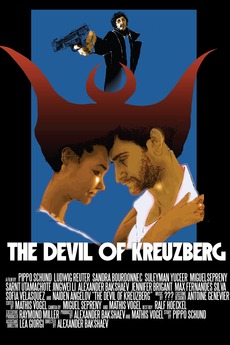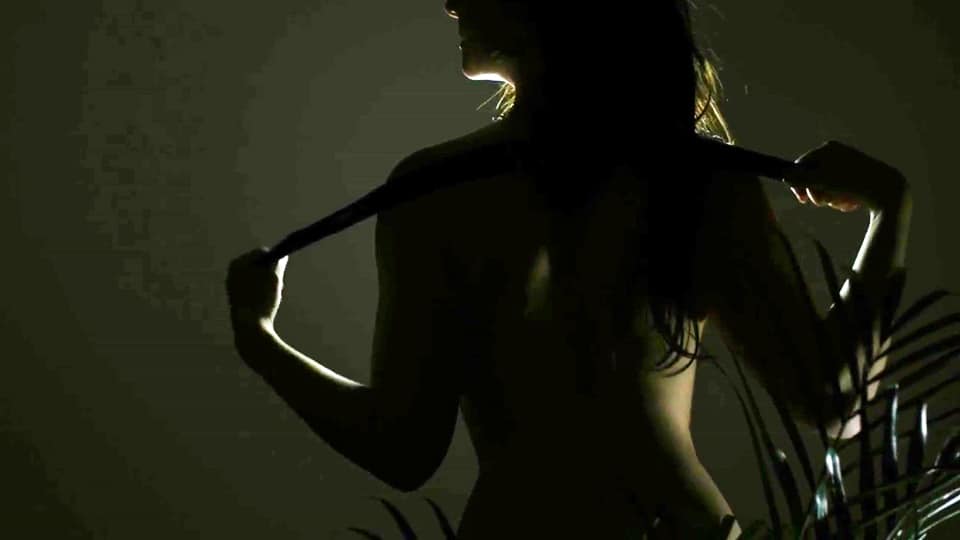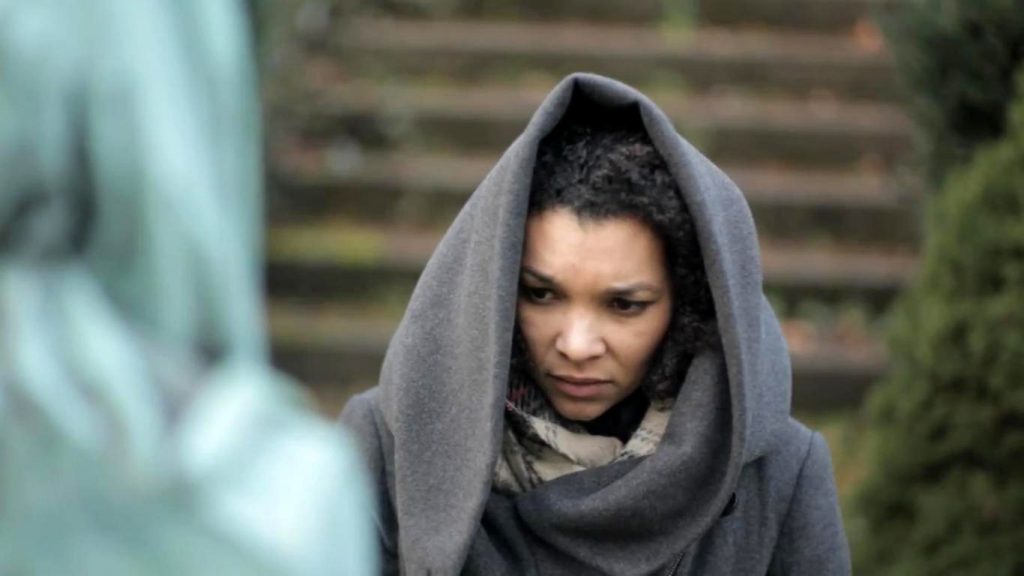 A few years ago, the site (in its old incarnation) was approached with an indie film which looked decidedly different to most films we receive; this turned out to be abundantly and delightfully the case. Whilst we do get a fair range of styles and genres, The Devil of Kreuzberg was a revelation: it’s rather unusual for directors to reference the Gothic so heavily in their publicity these days, but Alex Bakshaev did just that, and the film delivered – with a Europhile approach which really could have been a lost reel from the 1970s. After reviewing Alex’s second film (S&M: Les Sadiques) recently, I decided I had to ask this filmmaker about his very distinctive style and approach.
A few years ago, the site (in its old incarnation) was approached with an indie film which looked decidedly different to most films we receive; this turned out to be abundantly and delightfully the case. Whilst we do get a fair range of styles and genres, The Devil of Kreuzberg was a revelation: it’s rather unusual for directors to reference the Gothic so heavily in their publicity these days, but Alex Bakshaev did just that, and the film delivered – with a Europhile approach which really could have been a lost reel from the 1970s. After reviewing Alex’s second film (S&M: Les Sadiques) recently, I decided I had to ask this filmmaker about his very distinctive style and approach.
Warped Perspective: Hi, Alex – thank you for talking to us! The first thing I want to ask you relates to probably the most self-evident feature of your work: your filmmaking style is very unusual when compared with most of the indie cinema we receive. Is this a deliberate decision on your part – to sidestep the zeitgeist?
Alex Bakshaev: I try to make the kind of films that I myself would enjoy watching. Unfortunately, most contemporary films leave me cold. That’s why I hardly ever go to the cinema anymore (unless it’s a midnight screening of some classic). So yeah, perhaps I’m influenced by older films to a greater extent than other contemporary indie filmmakers.
WP:You are openly influenced by directors such as Jean Rollin (The Devil of Kreuzberg seems very Rollin to me) and of course Jess Franco, who is clearly an inspiration for Les Sadiques. Tell me a little about your influences, and how you got into these directors’ work. Do you have favourite films in mind, which impact upon your own films?
AB: Oh, Jean Rollin was a revelation! I’d read a review of Grapes of Death on some website, around 2002. The screenshots looked promising, so I got me a bootleg copy on VHS and loved it. Grapes of Death and Night of the Hunted are my favourite Rollin films. The Iron Rose is another important film. It doesn’t really work as a narrative, but you can learn so much about cinematography from that unique work.
 While I embraced Rollin instantly, getting into Franco took a while longer. I can’t quite remember which my very first Jess Franco experience was. It was around the same time as Jean Rollin, again on pirate VHS. It may have been Mari-Cookie and the Killer Tarantula (1998), or Cannibals(1980) with Al Cliver. Neither one is an easy film for a newcomer! It took me some three-four years of frustration to ‘get’ Franco’s cinema. I really started appreciating and obsessing over his work after having seen Exorcism (1974) and Eugenie De Sade (1971) with Soledad Miranda. These films have resonated with me, and have also prompted me to try my hand at more erotic themes. I’ve had the idea of making a film along the lines of Eugenie de Sade for a number of years. I got the opportunity to make that happen in 2016 with S&M: Les Sadiques. My original screenplay was even more closely modelled on Franco’s film, but got altered down the road due to budget restrictions. So yes, my films are very influenced by Rollin and Franco.
While I embraced Rollin instantly, getting into Franco took a while longer. I can’t quite remember which my very first Jess Franco experience was. It was around the same time as Jean Rollin, again on pirate VHS. It may have been Mari-Cookie and the Killer Tarantula (1998), or Cannibals(1980) with Al Cliver. Neither one is an easy film for a newcomer! It took me some three-four years of frustration to ‘get’ Franco’s cinema. I really started appreciating and obsessing over his work after having seen Exorcism (1974) and Eugenie De Sade (1971) with Soledad Miranda. These films have resonated with me, and have also prompted me to try my hand at more erotic themes. I’ve had the idea of making a film along the lines of Eugenie de Sade for a number of years. I got the opportunity to make that happen in 2016 with S&M: Les Sadiques. My original screenplay was even more closely modelled on Franco’s film, but got altered down the road due to budget restrictions. So yes, my films are very influenced by Rollin and Franco.
WP: How do you create your distinctive atmosphere on screen? I know that you work on a tight budget, your second film even more than your first, but you achieve a great deal with the resources available to you. How tricky is it to do this?
AB: These days I’m more and more drawn to music as a means of storytelling. If you cut the excessively talky scenes and make sure the score and the images bounce off each other, it’s hard to mess up the rest too badly. These are the lessons I’ve learned from Don Coscarelli, Jean Rollin, Jess Franco, Lucio Fulci and my other idols.
WP: You have so far used very strong female characters in your films, in particular Sandra Bourdonnec, who works brilliantly well in both of your films. Was this a deliberate decision? How difficult or easy has it been to recruit the right actors for the roles?
 AB: Yes, it’s been a deliberate tactic on my part. Many potentially amazing films have been ruined due to female characters being represented as not having a will of their own, subordinate to males. No amount of beautiful editing or plot twists can atone for that. So in my own work I’m going in the opposite direction, with often un-heroic males and bold, superior females. As for recruiting the actors, this has been down to blind luck. I don’t have the money or clout to pick and choose, to organize proper castings. So I take chances. In some cases, I’ve had amazing luck with actors; in others, less so.
AB: Yes, it’s been a deliberate tactic on my part. Many potentially amazing films have been ruined due to female characters being represented as not having a will of their own, subordinate to males. No amount of beautiful editing or plot twists can atone for that. So in my own work I’m going in the opposite direction, with often un-heroic males and bold, superior females. As for recruiting the actors, this has been down to blind luck. I don’t have the money or clout to pick and choose, to organize proper castings. So I take chances. In some cases, I’ve had amazing luck with actors; in others, less so.
WP: What have you learned so far about getting your films made, which you wish you had known at the start?
AB: The main thing I’ve learned is that I have no clue how to make films! No matter how well-prepared I ever thought I was, it was not nearly enough. Neither did I realise just how saturated the market is! There are more no-budget films out there than there are viewers. So, in a way, ignorance is bliss. Had I been aware of this beforehand, I would have been too intimidated to ever venture into filmmaking. I enjoy every aspect of the filmmaking process. I tend to either carry out the writing, camera and editing duties myself or supervise them very closely. So I do learn a lot of technical stuff on every film, but it’s not nearly enough. I’m still learning!
WP: And finally, what are your aspirations for the future? Do you have any plans for future films at present?
I don’t have any new films planned right now [Keri starts trying to subliminally influence Alex to make a new version of Venus in Furs…]
WP: That’s a shame, but I very much hope that changes in future. Thank you so much for your time, Alex!
AB: Thanks a lot for giving me the chance to talk about my work, Keri!
